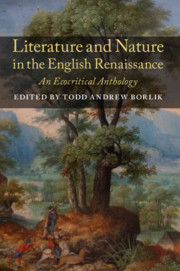Book contents
- Frontmatter
- Contents
- List of Illustrations
- Acknowledgements
- Editorial Principles: Towards the Ecocritical Editing of Renaissance Texts
- Introduction
- PART I Cosmologies
- PART II The Tangled Chain
- PART III Time and Place
- PART IV Interactions
- PART V Environmental Problems in Early Modern England
- Population
- Enclosure
- Deforestation
- The Draining of the Fens
- Pollution
- PART VI Disaster and Resilience in the Little Ice Age
- Appendix A Industrialization and Environmental Legislation in the Early Anthropocene: A Timeline
- Appendix B Further Reading: A Bibliography of Environmental Scholarship on the English Renaissance
Enclosure
from PART V - Environmental Problems in Early Modern England
Published online by Cambridge University Press: 05 June 2019
- Frontmatter
- Contents
- List of Illustrations
- Acknowledgements
- Editorial Principles: Towards the Ecocritical Editing of Renaissance Texts
- Introduction
- PART I Cosmologies
- PART II The Tangled Chain
- PART III Time and Place
- PART IV Interactions
- PART V Environmental Problems in Early Modern England
- Population
- Enclosure
- Deforestation
- The Draining of the Fens
- Pollution
- PART VI Disaster and Resilience in the Little Ice Age
- Appendix A Industrialization and Environmental Legislation in the Early Anthropocene: A Timeline
- Appendix B Further Reading: A Bibliography of Environmental Scholarship on the English Renaissance
Summary
By the late Middle Ages, wool had become the lifeblood of the English economy. As demand increased in the early sixteenth century thanks to the booming textile industry, the market value of wool skyrocketed. As a result, farmers began to expand pastureland at the expense of arable land and woodlands, and to enclose commons. This triggered a great number of economic and social problems, as some displaced agricultural workers apparently turned to theft to survive. More's protest not only anticipates sociological theories of crime but also intuits the monstrous environmental impact of cross-species assemblages, in this case, the “landlord/ sheep hybrid,” that transforms England into a “Ewe-topia” (Yates).
Source: Utopia, trans. Ralph Robinson (1551), C6v– D1r.
“But yet this is not only the necessary cause of stealing. There is another which, as I suppose, is proper° and peculiar to you Englishmen alone.” “What is that?” quoth the Cardinal.
“Forsooth,” quod I, “your sheep that were wont to be so meek and tame, and so small eaters, now, as I hear say, be become so great devourers and so wild that they eat up and swallow down the very men themselves. They consume, destroy, and devour whole fields, houses, and cities. For look in what parts of [C7r] the realm doth grow the finest and, therefore, dearest wool, there noblemen and gentlemen—yea, and certain Abbots, holy men, God wote °—not contenting themselves with the yearly revenues and profits that were wont to grow to their forefathers and predecessors of their lands, nor being content that they live in rest and pleasure nothing profiting— yea, much annoying—the weal-public, leave no ground for tillage. They enclose all in pastures. They throw down houses. They pluck down towns, and leave nothing standing but only the church to make of it a sheephouse. And as though you lost no small quantity of ground by forests, chases, lands, and parks, those good holy men turn all dwellings places and all glebe-land ° into desolation and wilderness.
- Type
- Chapter
- Information
- Literature and Nature in the English RenaissanceAn Ecocritical Anthology, pp. 403 - 412Publisher: Cambridge University PressPrint publication year: 2019



